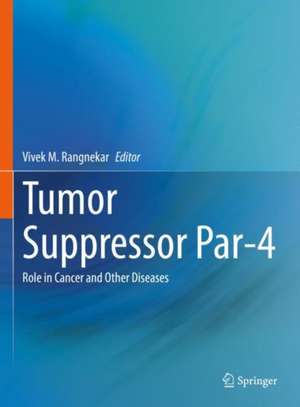Tumor Suppressor Par-4: Role in Cancer and Other Diseases
Editat de Vivek M. Rangnekaren Limba Engleză Hardback – 20 dec 2021
This second, companion volume will provide a comprehensive overview of Par-4’s role in cancer and other diseases. Chapters are written by leading researchers, and will be useful for a broad audience across the scientific community, particularly students and trainees, who are the next generation of scientists and clinicians to participate in new studies and discoveries on Par-4.
| Toate formatele și edițiile | Preț | Express |
|---|---|---|
| Hardback (2) | 1292.67 lei 6-8 săpt. | |
| Springer International Publishing – 20 dec 2021 | 1313.50 lei 3-5 săpt. | |
| Springer International Publishing – 8 ian 2022 | 1292.67 lei 6-8 săpt. |
Preț: 1313.50 lei
Preț vechi: 1382.63 lei
-5% Nou
Puncte Express: 1970
Preț estimativ în valută:
251.35€ • 259.70$ • 209.09£
251.35€ • 259.70$ • 209.09£
Carte disponibilă
Livrare economică 26 februarie-12 martie
Preluare comenzi: 021 569.72.76
Specificații
ISBN-13: 9783030805579
ISBN-10: 3030805573
Pagini: 331
Ilustrații: X, 331 p. 121 illus., 93 illus. in color.
Dimensiuni: 210 x 279 mm
Greutate: 1.16 kg
Ediția:1st ed. 2021
Editura: Springer International Publishing
Colecția Springer
Locul publicării:Cham, Switzerland
ISBN-10: 3030805573
Pagini: 331
Ilustrații: X, 331 p. 121 illus., 93 illus. in color.
Dimensiuni: 210 x 279 mm
Greutate: 1.16 kg
Ediția:1st ed. 2021
Editura: Springer International Publishing
Colecția Springer
Locul publicării:Cham, Switzerland
Cuprins
Introduction
Part 1
Chapter 1. Role of Par-4 in lung cancer
Chapter 2. Prostate apoptosis response-4 in nasopharyngeal carcinoma
Chapter 3. Role of Par-4 in Chemoresistance and targeted therapies in ovarian and endometrial cancers
Chapter 4. Regulation of Par-4 and role in GI tumors
Chapter 5. Role of Par-4 in prostate cancer
Chapter 6. Activation of apoptosis by Par-4 in pancreatic cancer
Chapter 7. Role of Par-4 and GRP78 in Glioblastoma
Chapter 8. Role of Par-4 in breast cancer recurrence
Chapter 9. Involvement of Par-4 in breast cancer
Chapter 10. Role of endogenous Par-4 in CLL
Chapter 11. Role of Par-4 in inhibition of TCL1 induced growth
Chapter 12. Par-4/THAP in survival of T-cell acute lympoblastic leukemia cells
Chapter 13. Par-4 expression in cholangiocarcinoma
Chapter 14. Par-4 suppresses breast cancer growth and invasion of breast cancer cells
Chapter 15. PAWR as direct SRC-1/HOXC11 suppression target
Chapter 16. Par-4 cleavage is required for TNF induced apoptosis
Chapter 17. Par-4 secretagogues
Chapter 18. Recombinant production and characterization of SAC
Chapter 19. Anti-tumor effects of plant derived Par-4
Chapter 20. Par-4 in Mycobacterium tuberculosis Infected Macrophages
Part 2 - Role in other Diseases
Chapter 21. Role of Par-4 in ceramide inducible effects in neurons
Chapter 22. Role of Par-4 in Alzheimers disease
Chapter 23. Dopamine signaling in association with induction of Par-4 protein expression
Chapter 24. Par-4 (PAWR) in major depressive disorder
Chapter 25. Par-4 dependent apoptosis of islet β cells in type 2 diabetes
Chapter 26. Par-4 in cardiac fibroblast senescence
Chapter 27. Par-4 in ocular development and disease
Chapter 28. Par-4 in apoptosis during human salivary gland development
Chapter 29. Suppression of Par-4 protects human renal proximal tubule cells from apoptosis
Chapter 30. Lessons from knockout mice
Part 3 - From Bench to Bedside
Chapter 31. Par-4 secretagogues in clinical trials
Chapter 32. Potential of Par-4 as a therapeutic target for cancer
Notă biografică
Vivek M. Rangnekar, Ph.D. is Professor and Alfred Cohen Chair in Oncology Research in the Department of Radiation Medicine and Associate Director of the Markey Cancer Center at the University of Kentucky. His laboratory studies the molecular cross-talk between oncogenes and tumor suppressor genes in an effort to tilt the balance in favor of tumor suppressor function. Dr. Rangnekar originally identified and discovered the tumor suppressor protein Par-4/PAWR in 1993.
Textul de pe ultima copertă
Par-4 is a naturally occurring tumor suppressor. Studies have indicated that overexpression of Par-4 selectively induces apoptosis in cancer cells while leaving normal, health, cells unaffected. Mechanisms contributing to this cancer-selective action of Par-4 have been associated with PKA activation of intracellular Par-4 in cancer cells or GRP78 expression primarily on the surface of cancer cells. On the other hand, endogenous Par-4 sensitizes cells to the action of a broad range of apoptotic inducers acting via the extrinsic and intrinsic pathways. A number of binding partners of Par-4 have been identified and shown to regulate Par-4 function in cancer and other diseases, such as Alzheimer’s and major depression. Recent studies have recognized a number of natural products, dietary supplements, synthetic molecules and FDA-approved drugs that induce the secretion of Par-4 protein to cause apoptosis in primary or metastatic tumors, one of which is in clinical trials. More than 50 different laboratories worldwide are involved in Par-4 based research of this unique protein that has progressed from the bench to clinical trials.
This second, companion volume will provide a comprehensive overview of Par-4’s role in cancer and other diseases. Chapters are written by leading researchers, and will be useful for a broad audience across the scientific community, particularly students and trainees, who are the next generation of scientists and clinicians to participate in new studies and discoveries on Par-4.
This second, companion volume will provide a comprehensive overview of Par-4’s role in cancer and other diseases. Chapters are written by leading researchers, and will be useful for a broad audience across the scientific community, particularly students and trainees, who are the next generation of scientists and clinicians to participate in new studies and discoveries on Par-4.
Caracteristici
Provides researchers and clinicians with new insights into potential drug discovery and development for various cancers and other human diseases
Describes the role of Par-4 in diverse diseases and their treatment
Highlights novel facets of Par-4 and its role in future clinical trials
Describes the role of Par-4 in diverse diseases and their treatment
Highlights novel facets of Par-4 and its role in future clinical trials
